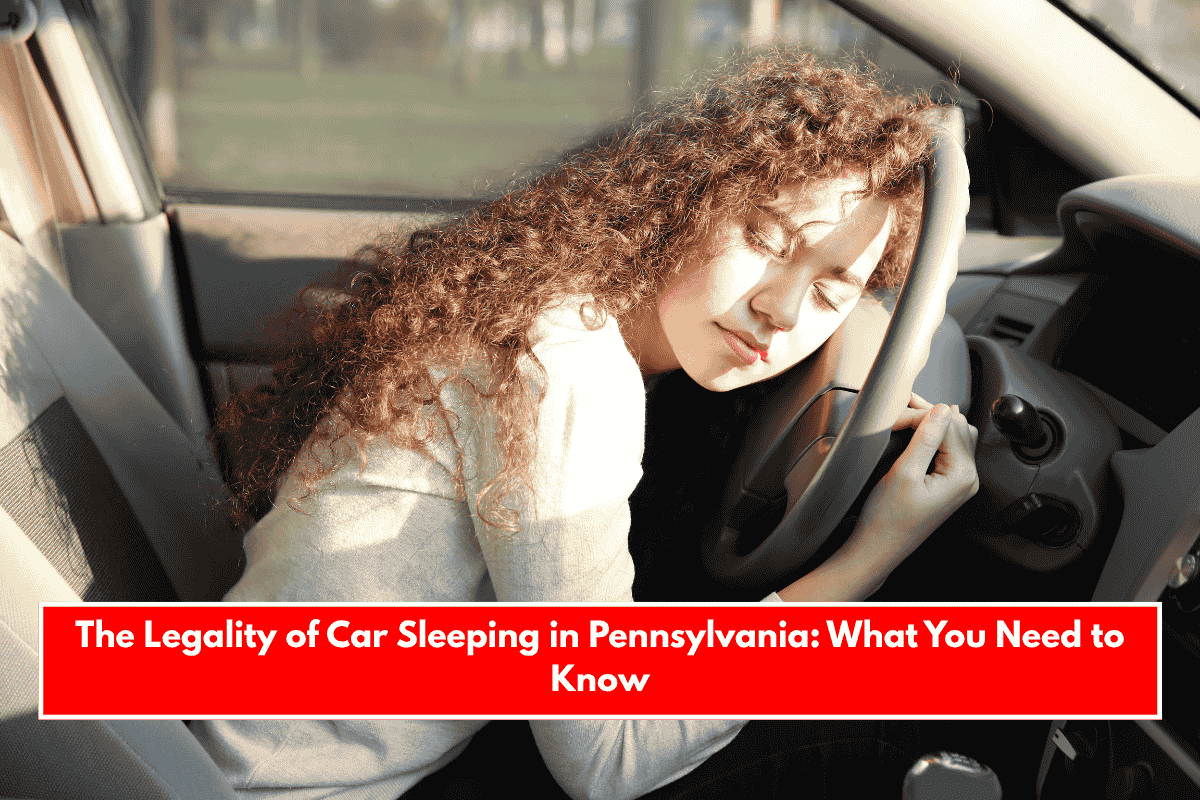Sleeping in your car in Pennsylvania is a nuanced legal issue that depends on several factors, including your location, the reason for sleeping in your vehicle, and your sobriety. Here’s a comprehensive overview of what you need to know before deciding to rest in your car in the Keystone State.
General Legality: Is Sleeping in Your Car Illegal?
Sleeping in your car is not inherently illegal in Pennsylvania. There are no statewide laws that categorically prohibit sleeping in a parked vehicle. However, your legal standing depends on where you park and local ordinances. Many municipalities have specific rules regarding overnight parking and vehicle habitation, especially in residential neighborhoods or on public streets. Violating these can result in fines or being asked to move along.
- Rest Areas: Pennsylvania Department of Transportation (PennDOT) rest areas allow parking for up to two hours in a 24-hour period, and overnight parking is technically permitted, though the two-hour limit is enforced. Turnpike service plazas managed by the Pennsylvania Turnpike Authority permit parking for up to 24 hours.
- Private Property: Sleeping in your car on private property (like a friend’s driveway) is generally allowed with the owner’s permission.
- Parking Lots: Many commercial parking lots and big-box retailers prohibit overnight parking. Always check for posted signs or ask for permission.
- Neighborhoods: Local ordinances may restrict or prohibit sleeping in your car on public streets or in residential areas, and repeated violations can lead to escalating fines or even impoundment of your vehicle.
DUI Laws: The Biggest Legal Risk
The most significant legal risk associated with sleeping in your car in Pennsylvania is related to DUI (Driving Under the Influence) laws. Pennsylvania’s DUI statutes are strict and unique in that you can be charged with a DUI even if you are not actively driving.
- Actual Physical Control: Pennsylvania law prohibits individuals from being in “actual physical control” of a vehicle while under the influence of drugs or alcohol. This means that if you are found asleep in the driver’s seat with the keys in your possession-even if the engine is off-you can be charged with DUI.
- Intent to Drive: Courts may interpret your presence in the driver’s seat, especially with keys nearby, as having the intent or potential to operate the vehicle while intoxicated.
- Avoiding DUI Charges: If you must sleep in your car while intoxicated, reduce your legal risk by:
- Moving to the back seat or passenger seat
- Placing the keys in a location that is not easily accessible (such as the trunk)
- Demonstrating no intent or ability to drive
Despite these precautions, there is still a risk of being charged, as the law is interpreted broadly to prioritize public safety.
Other Legal Considerations
- Long-Term Vehicle Habitation: Living in your vehicle for extended periods is likely to violate local ordinances concerning camping or habitation in vehicles, especially in urban areas.
- Rest Area Restrictions: At PennDOT rest areas, camping outside your vehicle or setting up tents is prohibited, and alcohol consumption is not allowed.
- Safety and Privacy: For your own safety, choose well-lit, busy areas and keep valuables out of sight. Some rest stops and parking lots are safer and more accommodating than others.
Key Rules for Car Sleeping in Pennsylvania
| Location Type | Permitted? | Time Limits | Special Considerations |
|---|---|---|---|
| PennDOT Rest Areas | Yes (in car only) | 2 hours per 24 hrs | No tents/camping outside vehicle; no alcohol |
| Turnpike Service Plazas | Yes | 24 hours | No overnight camping outside vehicle |
| Residential Neighborhoods | Varies by locality | Varies | Check local ordinances; risk of fines or being asked to move |
| Commercial Parking Lots | Varies | Varies | Many prohibit overnight stays; ask permission |
| While Intoxicated (anywhere) | High legal risk | N/A | Risk of DUI if in “actual physical control” of vehicle |
- Sleeping in your car in Pennsylvania is generally allowed if you follow parking rules and local ordinances.
- The greatest legal danger is sleeping in your car while intoxicated, as you can be charged with DUI even if you are not driving but are in a position to operate the vehicle.
- Always check for local restrictions, avoid residential streets unless permitted, and never sleep in your car while intoxicated unless you have taken strong precautions to eliminate any appearance of intent to drive.
When in doubt, opt for a designated driver, rideshare, or a hotel to avoid legal trouble and ensure your safety.
Sources:
- https://ciccarelli.com/the-truth-about-sleeping-in-your-car-and-dui-charges-in-pennsylvania/
- https://www.jackery.com/blogs/knowledge/is-it-illegal-to-sleep-in-your-car-what-states
- https://www.boondockersbible.com/learn/pennsylvania-rest-area-rules/
- https://wpst.com/car-drunk-pennsylvania-dui/
- https://reolink.com/blog/is-it-illegal-to-sleep-in-your-car/














